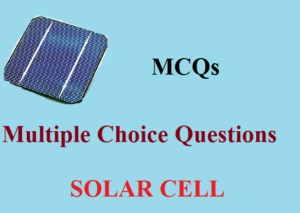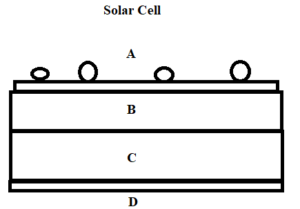Below you can find MCQ’s or multiple choice questions related to solar cell and related topics for engineering students. Correct answers are in red and bold font.
1. a PV cell is also called?
a) IR cell
b) VU cell
c) Solar cell
d) All of the above
2. PV effect in solar cell converts solar energy into _____?
a) Electric energy
b) Mechanical energy
c) Chemical energy
d) All of the above
3. Which of the following parameters are the electrical characteristics of a solar cell?
a) Voltage
b) Current
c) Resistance
d) All of the above
4. Which of the following is the amount of voltage a single solar cell generates?
a) 0.5V to 0.6V
b) 0.7V to 0.8V
c) 0.9V to 1V
d) 1V to 1.1V
5. How many layers does a solar cell have?
a) 2
b) 3
c) 4
d) 5
6. Which of the following are the components of a solar cell?
a) Nickle plating
b) PN Silicon
c) Anti-reflecting coating
d) All of the above
7. A solar cell is a _____ type of energy source.
a) Non-renewable
b) Renewable
c) Decomposable
d) All of the above
8. A solar cell has a lifespan of _____ years.
a) 10
b) 20
c) 30
d) 40
9. A solar cell is a ______.
a) Zenor diode
b) PV cell
c) PN diode
d) Both b and c
10. Which layer of a PV cell is thicker?
a) Depletion
b) P
c) N
d) None
11. The light energy supplied to solar cell is in the form of_____.
a) Electrons
b) Photons
c) Neutrons
d) None
12. The solar incident light on the cell breaks ______ condition of the diode’s junction
a) Thermal expansion
b) Breakdown
c) Thermal equilibrium
d) None of the above
13. The optical absorption of material used in solar cell must be?
a) Zero
b) Low
c) High
d) Infinite
14. The manufacturing process of a solar cell is same as manufacturing process of ________.
a) Electronic devices
b) Memory chips
c) Electrostatic devices
d) None of the above
15. The majority charge carriers in P-type semiconductor are______.
a) Electrons
b) Neutrons
c) Holes
d) None of the above
16. The majority charge carriers in N-type semiconductor are______.
a) Electrons
b) Neutrons
c) Holes
d) None of the above
17. In a PV cell, the band gap indicates?
a) Material area occupied
b) Material light absorption
c) Size of the cell
d) None of the above
18. Organic based solar cells are designed using ______ rich components.
a) Oxygen
b) Nitrogen
c) Carbon
d) Helium
19. Which of the following functions can be enhanced by using an organic PV cell?
a) Transparency
b) Color
c) Bandgap
d) All of the above
20. Which of the following types of solar cell uses lens for charging?
a) Multi-junction PV
b) Quantum Dots
c) Organic PV
d) Concentrating PV
21. Which of the following materials cannot be used as solar cell materials?
a) Silicon (Si)
b) Gallium Arsenide (GaAs)
c) Cadmium Sulfide (CdS)
d) Lead (II) Sulfide (PbS)
22. The principle of solar cell is same as photodiode.
a) True
b) False
23. What should be the band gap of the semiconductors to be used as solar materials?
a) 0.5 eV
b) 1.0 eV
c) 1.5 eV
d) 1.9 eV
24. Which of the following should not be the characteristic of the solar cell material?
a) High energy band
b) High absorption
c) High conductivity
d) High availability
25. Which region of the following solar cell is coated with metal?

a) A
b) B
c) C
d) D
26. During the collection of electron-hole pairs, holes are collected by_______.
a) Back contact
b) Front contact
c) Finger electrodes
d) Si-wafer
27. What is the difference between solar cell and photodiode?
a) No external bias in solar cell
b) No external bias in photodiode
c) Larger surface area in photodiode
d) No difference
28. Solar cell is made from bulk materials that is cut into wafer of _________ thickness.
a) 120-180µm
b) 120-220µm
c) 180-220µm
d) 180-240µm
29. __________ is one of the most important materials which is also known as solar grade silicon.
a) Crystalline silicon
b) Crushed silicon
c) Silicon
d) Powdered silicon
30. Dye-sensitized solar cells are made from ______ organic dye.
a) Aniline
b) Safranine
c) Ruthium melallo
d) Induline
31. Quantum dot solar cells are based on _______.
a) Gratzel cell
b) Voltaic cell
c) Solar cell
d) Galvanic cell
Discover more from Electrical Engineering 123
Subscribe to get the latest posts sent to your email.

